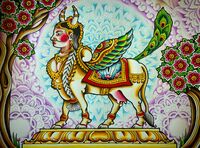Kuladara: Difference between revisions
Jump to navigation
Jump to search
Lyooonheimer (talk | contribs) No edit summary |
Lyooonheimer (talk | contribs) No edit summary |
||
| Line 8: | Line 8: | ||
| alt = <!-- descriptive text for use by speech synthesis (text-to-speech) software --> | | alt = <!-- descriptive text for use by speech synthesis (text-to-speech) software --> | ||
| caption = One interpretation of Kuladara from the [[Gaism|Gai]] Temple in [[Mutapanda]]. | | caption = One interpretation of Kuladara from the [[Gaism|Gai]] Temple in [[Mutapanda]]. | ||
| native_name = | | native_name = कुलदार | ||
| native_name_lang = | | native_name_lang = | ||
| pronunciation = | | pronunciation = | ||
| Line 80: | Line 80: | ||
{{Template:Gaism}} | {{Template:Gaism}} | ||
'''Kuladara''' ([[Mahanan]]: कुलदार, Kuladāra) also known as Sabaikā Bhagavāna (God of All) is the sole God/Goddess of [[Gaism]], who is considered to be the creator of the world and of all of the human race. Kuladara has no official interpretation, being seen as either a woman or a man, a cow or a human or a mixture of both depending on the interpretation of Kuladara. | |||
[[Category:Gaism]] | [[Category:Gaism]] | ||
Revision as of 11:04, 14 April 2022
God of all, Kuladara | |
|---|---|
कुलदार | |
 |
| Part of a series on |
| Gaism |
|---|
 |
Kuladara (Mahanan: कुलदार, Kuladāra) also known as Sabaikā Bhagavāna (God of All) is the sole God/Goddess of Gaism, who is considered to be the creator of the world and of all of the human race. Kuladara has no official interpretation, being seen as either a woman or a man, a cow or a human or a mixture of both depending on the interpretation of Kuladara.